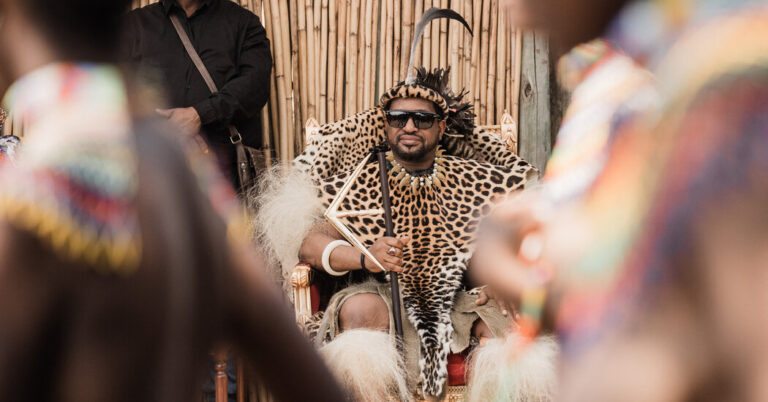A judge in South Africa has set aside the president’s recognition of the Zulu king, the latest twist in a vicious and long-running battle over who is the rightful leader of one of Africa’s most storied monarchies.
The ruling, issued by Judge Norman Davis on Monday, raised the prospect that King Misuzulu, 49, who last year ascended to the throne made famous by the legendary King Shaka Zulu, might have to step down.
The uncertainty is likely to fuel tension within the royal family that oversees South Africa’s largest and most culturally influential traditional kingdom. Since the death of King Goodwill Zwelithini in March 2021 after a 50-year reign, royal family members have lobbed heated accusations at one another, including claims that wills were forged, that rivals were poisoned, that secret meetings were convened and that King Misuzulu was an incestuous playboy.
The drama has captivated a nation home to about 14 million Zulus, whose language is the most widely spoken in South Africa.
Under South African law, the president must give his blessing before any traditional leader is installed — which President Cyril Ramaphosa bestowed on King Misuzulu in March 2022. But Judge Davis said that Mr. Ramaphosa had not followed the necessary legal requirements to settle the disputes over the rightful heir before recognizing King Misuzulu, including failing to heed the advice of a mediation panel that the president had appointed.
The panel had suggested that Mr. Ramaphosa appoint an interim king and wait until all legal proceedings were completed before recognizing the Zulu nation’s permanent leader, Judge Davis wrote in his decision. Monday’s ruling set aside Mr. Ramaphosa’s recognition and ordered him to convene a panel to investigate the disputes within the royal family.
Mr. Ramaphosa’s spokesman, Vincent Magwenya, said the president’s legal team was studying the judgment and would determine the way forward. Prince Africa Zulu, a spokesman for King Misuzulu, said in a statement that the king and the family were reviewing the decision before determining how to proceed.
The lawyers who argued the case against King Misuzulu expect the president to appeal the ruling.
The royal family was, naturally, divided over the court judgment.
“Currently, there is no Zulu king,” said Johann Hammann, a lawyer for Prince Simakade, a brother of King Misuzulu who claims to be the rightful heir to the throne and who is among the family members who initiated the legal case.
Prince Thami Zulu, who is close to King Misuzulu, maintained that it was clear that he remained king. The prince pointed to the portion of Judge Davis’s decision stating that he would not overturn a prior court’s ruling that, under customary law, King Misuzulu was “the rightful heir to the throne.”
The government may have technical issues to resolve regarding the president’s recognition, but that should have no bearing on King Misuzulu’s standing, Prince Thami said. “There’s no way any other person can have the claim to that,” he said. “Not in this lifetime. This one was done and dusted a long time ago.”
Although the Zulu king holds no government powers, he holds sway as a moral and cultural leader, oversees a vast swath of land that belongs to the kingdom and shepherds a $3.9 million annual budget from the government. His influence among the country’s largest ethnic group also attracts attention from political figures, who tend to court the king around election time.
The Zulu succession question has been complicated by the tradition of polygamy. King Zwelithini had six wives and at least 28 children. King Misuzulu claims to be the rightful heir in part because his mother, the king’s third wife, was from the royal family in Eswatini (formerly Swaziland). He and his supporters argue that his mother’s royal heritage gives her precedence over the king’s five other widows — and that as her first son, King Misuzulu, is the rightful successor.
But his opponents say that a king is chosen when core members of the royal family convene and decide who is best suited to lead.
In an interview with The New York Times last year, King Misuzulu called the dispute a case of “family domestic terrorism” — but said that he was claiming what was rightfully his.
The moment a king’s soul leaves his body, he said, “a new king takes over immediately.”



